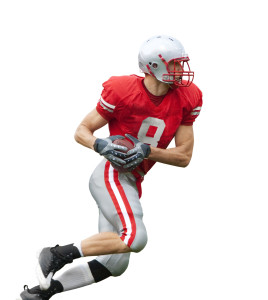Custom-Fit Sports Mouth Guards
Hundreds of thousands of Americans a year sustain dental injuries during competitive play, and a large number of those injured are children.
 Research has shown that wearing custom-fit sports mouth guards can reduce the risk of severe injuries. The American Dental Association (ADA) estimates that the use of mouthguards prevents approximately 200,000 injuries per year in high school and college football alone.
Research has shown that wearing custom-fit sports mouth guards can reduce the risk of severe injuries. The American Dental Association (ADA) estimates that the use of mouthguards prevents approximately 200,000 injuries per year in high school and college football alone.
Anyone who plays sports or engages in athletic activity, whether competitive or not, can protect themselves by wearing an athletic mouthguard. We offer custom, form-fitting mouth guards to patients of all ages.
Damaging jaw and tooth impact can be caused by everything from a direct contact to an awkward or misplaced step while running. Custom-made Intact mouthguards provide stability to your jaw and cushion the blows that can cause severe dental injuries, like broken teeth, fractures in the jaw, gum lacerations and injuries to your lips or tongue caused by your own teeth.
Growing evidence suggests that quality, properly fitting mouthguards also reduce the forces that can cause concussions and neck injuries.
The Advantage of using a Dentist to create your Mouth Guard
We can ensure that your mouthguard is tightly fit to your teeth to provide maximum protection. Utilizing our digital x-ray technology, we will make sure that the guard is fitted to protect your teeth, gums, lips, tongue and cheeks. We provide guards in different colors and designs.
If you would like to learn more about our custom-fit athletic mouth guards, call us today to set an appointment.
TMJ/ Bruxism Therapy & Splints (stop grinding teeth at night!)
TMJ disorders (also called TMD disorders) cause tenderness and pain in the temporomandibular joint (TMJ) — the joint on each side of your head in front of your ears, where your lower jawbone meets your skull. This joint allows you to talk, chew and yawn.
TMJ disorders are caused by many different types of problems: arthritis, jaw injury, or muscle fatigue from clenching or grinding your teeth during sleep or while awake. Teeth grinding is also referred to as Bruxism in the dental field.
What are the symptoms of TMJ Disorder?
- Pain or tenderness in the face, jaw joint area, neck and shoulders, and in or around the ear when you chew, speak, or open your mouth wide
- Limited ability to open the mouth very wide
- Jaws that get “stuck” or “locked” in the open or closed mouth position
- Clicking, popping, or grating sounds in the jaw joint when opening or closing the mouth
- Difficulty chewing or a sudden uncomfortable bite
- Swelling on the side of the face
- Toothaches
There are several options for treating TMJ/TMD disorder, with surgery being the last resort option. We offer custom-fit night guards – or splints – that can help you stop grinding your teeth at night. We will create a night guard oral appliance specifically for you, so that it will fit comfortably and not prevent you from sleeping. By managing your Bruxism, we can lessen the symptoms of TMJ.
If you would like to learn more about our custom-fit night guards, call us today to set an appointment.
